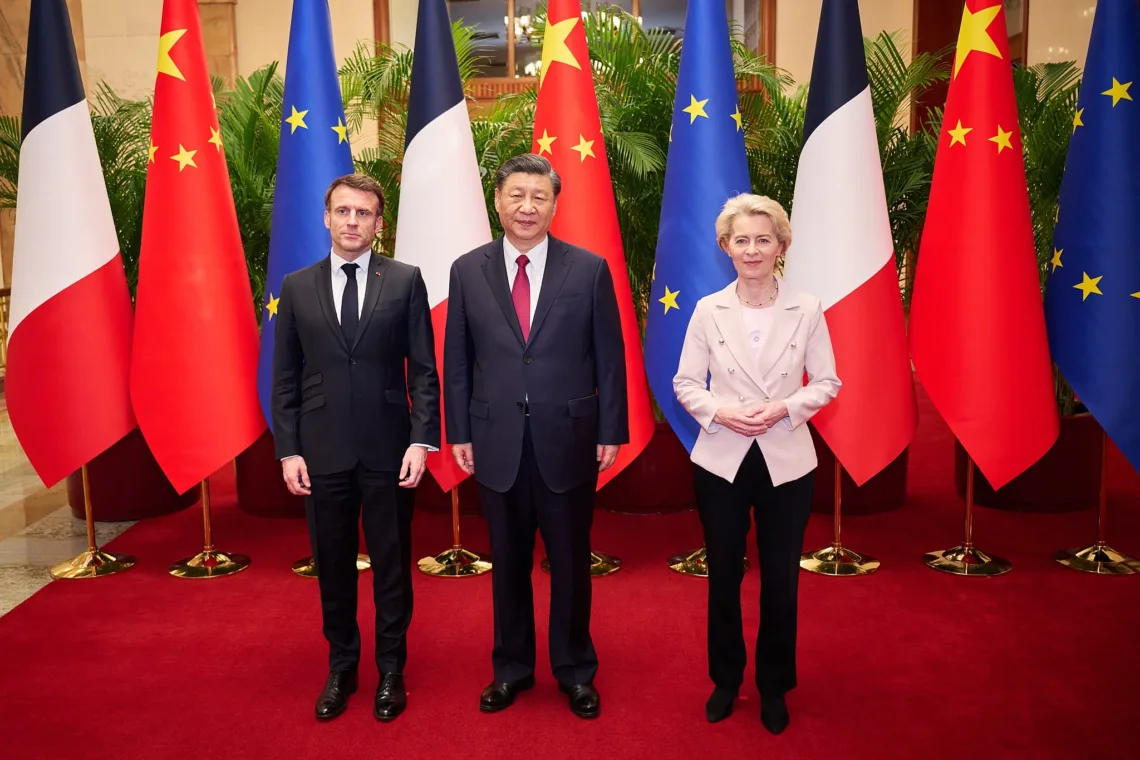We must be careful not to become too closely linked to the United States on the issue of Taiwan, said France’s hard-pressed President Emmanuel Macron to French journalists, after his four-day state visit to China. Macron had several sensational kicks against the US, including against the dollar.
The interview is reproduced in Politico:
“The paradox would be that, overcome with panic, we believe we are just America’s followers,” Macron said in the interview. “The question Europeans need to answer … is it in our interest to accelerate [a crisis] in Taiwan? No. The worse thing would be to think that we Europeans must become followers on this and take our cue from both the U.S. agenda and a Chinese overreaction,” he said.
Strategic autonomy
On board the COTAM Unité, France’s presidential plane, an Airbus A330-200, he said the biggest risk Europe faces is that it “gets caught up in crises that are not ours, which prevents it from building its strategic autonomy.
“The great risk Europe faces is that it gets caught up in crises that are not ours, which prevents it from building its strategic autonomy,” he said during the flight from Beijing to Guangzhou, in southern China, while aboard COTAM Unité France’s Air Force One.
The phrase “strategic autonomy” is well established in the EU’s inner circles, but few if any are as active in its use as the French president. That prompts Politico’s journalist to send an ever-so-small verbal hip kick in the direction of the sometimes very self-centred and arrogant Macron:
Speaking with POLITICO and two French journalists after spending around six hours with Chinese President Xi Jinping during his trip, Macron emphasised his pet theory of “strategic autonomy” for Europe, presumably led by France, to become a “third superpower.”
Speaking to POLITICO and two French journalists after spending about six hours with Chinese President Xi Jinping during the trip, Macron emphasised his favourite theory of “strategic autonomy” for Europe, presumably led by France (read: in Macron’s eyes , journ.anm.), will become a “third superpower”.
With his emphasis on this term, a clear separation arose between Macron and the head of the European Commission, Ursula von der Leyen, who was on part of the trip. She worded herself more in line with the US official line:
“Stability in the Taiwan Strait is of paramount importance,” European Commission President Ursula von der Leyen, who accompanied Macron for part of his visit, said she told Xi during their meeting in Beijing last Thursday. “The threat [of] the use of force to change the status quo is unacceptable.”
Delusions
Chinese President Xi Jinping, like Chinese leaders in general, often maintains a very diplomatic tone towards the international press. But this time he is quoted as having said that anyone who thinks they can influence China on the Taiwan issue is delusional:
Xi responded by saying anyone who thought they could influence Beijing on Taiwan was deluded.
It is still not as startling as the fact that Macron actually pretends to agree with the Chinese president.
“Europeans cannot resolve the crisis in Ukraine; how can we credibly say about Taiwan, ‘watch out, if you do something wrong we will be there’? If you really want to increase tensions that’s the way to do it,” he said.
Energetic Macron
Macron did not stop there. After first getting the French energy company EdF, Europe’s largest, to sign cooperation agreements with CGN and the China Energy Investment Corporation respectively on the further development of nuclear power and offshore wind technology, he had several kicks up his sleeve for the USA:
Macron also argued that Europe had increased its dependence on the US for weapons and energy and now needed to focus on increasing its European defence industry.
He also suggested Europe should reduce its dependence on the “extraterritoriality of the U.S. dollar,” a key policy objective of both Moscow and Beijing. “If the tensions between the two superpowers heat up… we won’t have the time nor the resources to finance our strategic autonomy and we will become vassals,” he said.
Whether the French president’s fresh statements particularly resonate with his own voters is more doubtful. French voters will probably also not be happy that Macron and his entourage of French business leaders signed one contract for the sale of 50 new (Airbus) helicopters, at the same time that Airbus wants to set up a new aircraft factory in China.
Politico’s article is equipped with an unusual, editorial tail, in which it is emphasised that Politico does not accept interviewees deleting things they have actually said, but in order to get the French president to speak at all, they had to accept the rules of the presidential palace. The tale ends like this:
The quotes in this article were actually said by the president, but some parts of the interview in which the president spoke even more frankly about Taiwan and Europe’s strategic autonomy were cut out by the Elysée. (Politico)
This interview will be read with a magnifying glass by many, also outside the ranks of the bureaucrats, in the East and West in the days to come.
Europe must resist pressure to become ‘America’s followers,’ says Macron (Politico)
France, China sign cooperation deals in nuclear and renewable energy (Reuters)
Photographer: Dati Bendo, Attribution, via Wikimedia Commons

